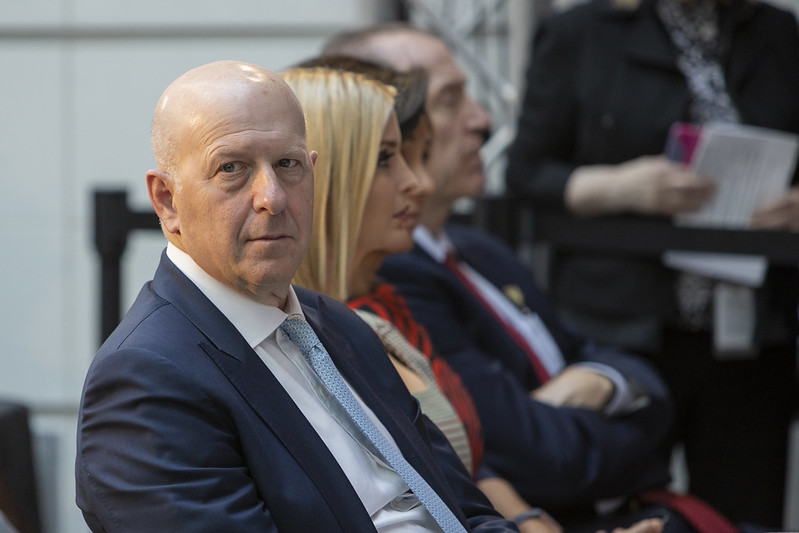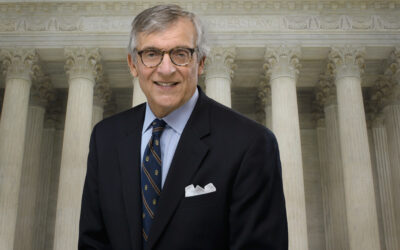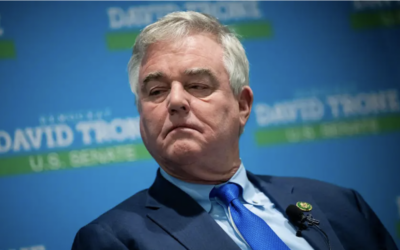This morning, National Legal and Policy Center presented a shareholder proposal at The Goldman Sachs Group, Inc.‘s annual meeting in Salt Lake City that asked the board to implement a policy to require the Chair of the Board of Directors to be an independent member from the CEO. In other words, the same executive could not hold both roles.
Currently David Solomon is Chairman and CEO.
Goldman Sachs’s board of directors opposed our proposal, as explained on page 76 of the company’s proxy statement. NLPC filed a response to the board’s opposition statement with the Securities and Exchange Commission weeks ago.
Speaking at the meeting as sponsor of the resolution was Luke Perlot, associate director of NLPC’s Corporate Integrity Project. A transcript of his five-minute remarks follows:
Good morning,
Over the last year, the need for Goldman Sachs to separate its CEO and Chair positions has become obvious. Mr. Solomon’s current dual role shields him from accountability for his numerous missteps. Our Proposal advocates for the board to separate these roles and appoint an independent board chair.
While we’ve brought this proposal the last two years, media attention has exploded this year by comparison, and Institutional Shareholder Services and Glass Lewis have both encouraged shareholders to support our proposal for the first time. The difference is that the controversies surrounding Mr. Solomon’s leadership have become impossible to ignore.
Before addressing Mr. Solomon’s management shortcomings, we should note that independent chair positions have become the norm on purely philosophical grounds. Let’s be clear: The role of CEO is demanding and expansive. Conversely, the Chair’s role is to ensure robust oversight, challenge management’s decisions when necessary, and safeguard the interests of shareholders. When combined, these roles create a concentration of power that is fundamentally at odds with the principle of checks and balances.
Our proposal aligns with the best practices endorsed by leading governance scholars and financial experts.
As the legendary late ITT Corporation CEO Harold Geneen wrote in his 1984 book Managing: “If the board of directors is really there to represent the interests of the stockholders, what is the chief executive doing on the board? Doesn’t he have a conflict of interest? He’s the professional manager. He cannot represent the shareholders and impartially sit in judgment of himself.”
The CFA Institute, a beacon of investment professionalism, explicitly supports this separation, stating it enhances the board’s independence and its ability to monitor the executive team. The independent chair has also been endorsed by CalPERs and argued for in the Harvard Business Review.
Empirical evidence shows major companies embracing the advantages of an independent chair. An increasing number of S&P 500 companies implement a governance model where the roles of Chairman and CEO are separate. This shift reflects a broader understanding within the corporate governance community that an independent chair is the best model to achieve effective oversight and strategic guidance.
Now, let us consider the specific situation at Goldman Sachs under Mr. Solomon’s combined leadership. The confluence of CEO and Chairman in one individual has not only blurred the lines of accountability but has also enabled decisions that shareholders, employees, and the media have found questionable.
The need for an independent chair is further exemplified by the controversies and challenges that have emerged, affecting the Company’s reputation and potentially, its long-term stability.
Furthermore, Mr. Solomon’s poor decision-making led to substantial losses in the company’s retail banking division, notably the failed GreenSky acquisition. The much-discussed foray into new consumer banking markets was a strategic attempt to diversify the company’s revenue streams. However, it has faced numerous challenges and setbacks, resulting in financial losses and a tarnished brand reputation. This expansion was marked by an overestimation of Goldman’s capability to penetrate consumer banking, illustrating a lack of critical oversight that an independent chairman might have mitigated. Unfortunately, Mr. Solomon ignored warnings made by the divisions senior executives to avoid sinking more resources into the floundering initiative. His strong-handed leadership cost the company several billion in avoidable losses.
Under Mr. Solomon’s tenure, Goldman Sachs has faced significant challenges related to workplace culture, including high attrition rates among female leaders and allegations of sexual harassment. Reports indicate a striking departure of female partners since 2018. Furthermore, Mr. Solomon’s sexual remarks and inappropriate conduct have diminished his and the firm’s credibility, and risk normalizing a culture of sexual discrimination. This troubling trend highlights the urgent need for an independent chairman to ensure accountability and uphold the firm’s commitment to a respectful workplace.
Additionally, Mr. Solomon’s involvement in low-priority ESG activities has drawn criticism from various stakeholders. The focus of these initiatives has at times seemed misaligned with the Company’s core business objectives, potentially diverting attention and resources from more critical areas of operation. This misalignment calls into question the prioritization and decision-making processes under the current governance structure.
We urge the Board to be adopt a more accountable structure by appointing an independent chair, and for my fellow shareholders to vote for Item 4.
Read NLPC’s shareholder proposal for The Goldman Sachs Group, Inc. annual meeting here.
Read NLPC’s response, filed with the SEC, to the Goldman Sachs board’s opposition to our shareholder proposal here.
Watch the video produced by NLPC in support of its shareholder proposal for Goldman Sachs below:
For three years NLPC has called for @GoldmanSachs to curb the power of Chairman/CEO David Solomon; finally @issgovernance and @GlassLewis agree with us (#WeToldYouSo) #GoldmanSachs #investing #WallStreet #EDM pic.twitter.com/HdDN6gOcXw
— NLPC (@NLPC) April 16, 2024









